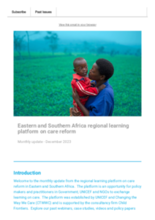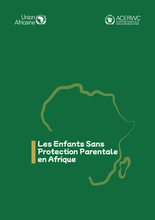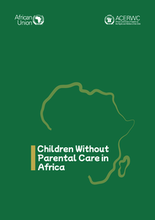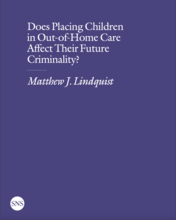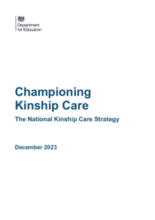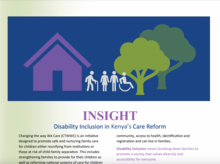Demographic Data
|
Sources: World Bank, UNICEF, UNDP HDR 2015, DHS 2013 |
Displaying 641 - 650 of 14551
This is the monthly update of the Eastern and Southern Africa Regional Learning Platform published in December 2023.
Le Comité africain d'experts sur les droits et le bien-être de l'enfant (ACERWC/le Comité), en collaboration avec les États membres de l'Union africaine, les organisations partenaires, les enfants et les jeunes, a lancé la première étude continentale en son genre sur les enfants sans protection parentale (CWPC) en Afrique. L'étude, menée de 2020 à 2022, au milieu de la pandémie de COVID-19, couvre plus de 43 pays dans les cinq régions d'Afrique.
The African Committee of Experts on the Rights and Welfare of the Child (ACERWC/the Committee), in collaboration with African Union Member States, partner organizations, children and young people, launches the first of its kind Continental Study on Children Without Parental Care (CWPC) in Africa. The study, conducted from 2020 to 2022, amid the COVID-19 pandemic, covered over 43 countries in the five regions of Africa.
This report aims to shed light on care pathways and placement stability for infants in Wales, using data from the Children Looked After census collected by Welsh Government. The report is divided into two parts, the first of which focuses on infant entry to care and the second, which focuses on pathways and placement outcomes.
This report provides new evidence about entry routes to care, pathways through care, and placement outcomes for the very youngest children in the care system in Wales. It is the seventh in the Born into Care series.
This report draws 14 lessons from academic research on the effects of out-of-home care on subsequent criminality. Most of the studies references in this review of based in Sweden.
This is the first-ever National Kinship Care Strategy to be published in the UK. The strategy establishes “the foundations for a future, transformed kinship care system in England.”
Native American mothers whose children were separated from them – either through child removal for assimilation into residential boarding schools or through coerced adoption – experience the kind of grief no parent should ever feel. Yet theirs is a loss that is ongoing, with no sense of meaning or closure.
Disability inclusion means breaking down barriers to promote a society that values diversity and accessibility for everyone. In 2023, Changing the Way We Care Kenya included a disability inclusion reflection learning exercise aimed at collecting views and feedback, and documenting how the initiative had impacted on lives of caregivers and children with disabilities, and how disability issues were be included in the care reform agenda.
The process of changing the model of service provided by an organization from one that is residential care service focused to a non-residentia

